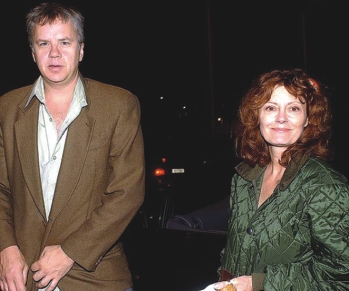|
International  How a Heart-throb Became the Voice of Liberal America How a Heart-throb Became the Voice of Liberal America
George Clooney was once famous for his party lifestyle and the beautiful women that he dated. Now it's politics that increasingly sets his pulse racing. Paul Harris reports.
GEORGE Clooney was adamant about one thing last week: he was not attacking the President in his gripping new film about the Middle East - he was slamming the entire geopolitical system.
'It is not an attack on the Bush administration, but it is an attack on the system that has been in place for 60 or 70 years - oil always being at the centre of it,' the actor told an interviewer. The debonair Clooney, the playboy actor once best known for keeping a pet pig and being the consummate ladies' man, has clearly taken on an unlikely role: the new King of Liberal Hollywood.
Unseating old-time liberal 'actor-vists' such as Warren Beatty, Tim Robbins and director Rob Reiner, Clooney has now emerged as the leading political voice in Hollywood, winning plaudits from liberals and stinging attacks from conservatives.
 |
Tim Robbins and Susan Sarandon: Hollywood's most famous liberal married couple created a stir at the 1993 Oscar ceremony by lambasting the government on its treatment of HIV-positive Haitian immigrants. Pro free-speech and highly suspicious of American overseas interests, the pair abhor the Bush administration |
His two most recent films have slammed a broad range of targets, including US foreign policy in the Middle East, the corruption of oil companies and the Red-baiting of the McCarthyite era. In interview after interview, Clooney has spoken out on his favourite social issues and is a senior campaigner with the Make Poverty History movement that saw him recently lobby the president of the World Bank for aid to Africa alongside rock star Bono. 'I'm an old-time liberal and I don't apologise for it,' he recently told Newsweek
It is a remarkable transformation for the man who first won the hearts of a generation of female fans in the hospital drama ER and whose early films included Return of the Killer Tomatoes. But it is a change that has won critical acclaim for his most recent politicised films and led to talk of him being rewarded at the Oscars ceremony next year.
In Syriana, Clooney's latest work, which opened last week in New York, the actor plays a world-weary CIA agent caught in a web of political intrigue surrounding control of oil in the Middle East. It is a complex story of interwoven plots which aims to expose the true realities of power in the world. Clooney was also executive producer on the film, which pulls no punches in its conclusion that the political system has become a slave to the oil industry.
'[Syriana] shakes us up and prompts us to question world policies ... We need more movies like this,' said Claudia Puig, a film reviewer for USA Today.
 |
Sean Penn: The Oscar-winning actor has not held back his opposition to the war in Iraq. Penn was hailed as an 'American hero' when he rescued 40 survivors after Hurricane Katrina in New Orleans |
Clooney also suffered for his art. He gained 35 pounds to play the pudgy middle-aged spy in Syriana and hid his good looks behind a bushy beard. He also damaged his spine during filming, which saw him in such agony that he ended up drinking heavily to dull the pain.
Syriana came fast on the heels of Good Night And Good Luck, which Clooney directed and also acted in, a portrayal of the conflict between TV newsman Edward Murrow and the anti-communist witch-hunter, Senator Joseph McCarthy. The film tells how Murrow turned on McCarthy and eventually brought him down.
Clooney portrays the conflict as a principled stance by a campaigning liberal journalist who fought injustice and stood up against big, bullying politicians. It is a compelling story in its own right, but Clooney has never hidden the fact that it draws uncomfortable parallels with a post-11 September media seemingly cowed into being uncritical of White House policy. The film has led many pundits to predict Oscars glory. Newsweek's David Ansen called it 'the most compelling American movie of the year so far'.
Both Clooney's recent films are unusual in taking on a series of controversial targets in mainstream cinematic releases. At one stage Syriana explores the motivations behind a
 |
Jane Fonda: 'Hanoi Jane' was most famed for posing in front of an anti-aircraft gun in North Vietnam in 1972. Denouncing the US Air Force as 'professional killers' and extolling the virtues of communism, pacifist Fonda spent her off-screen career pleading ad nauseam for harmony and social justice |
man who becomes a suicide bomber, while Good Night uses archive footage of McCarthy to illustrate its point about the climate of fear he created. That has, in turn, put Clooney in the sights of conservative critics, who have slammed him as the latest in a long line of Hollywood liberals out of touch with the concerns of mainstream America. Right-wing polemicist Ann Coulter has leapt to the defence of McCarthy's legacy and the blacklisting of many Hollywood artists and screenwriters. 'Clooney's movie ... failed to produce one person unjustly accused by McCarthy,' Coulter said. 'Thanks to McCarthy, and no thanks to Murrow, the worst horror to befall an American citizen in the 1950s was the dire prospect of losing a movie credit - although, since then, I suppose having to watch a George Clooney movie would run a close second.'
Clooney's rise comes as the influence of a previous generation of Hollywood liberals, headed by Beatty, appears to be fading. Beatty has flirted with running for office in a 'will he, won't he?' drama that has played out in Beverly Hills for three decades. Yet Beatty's long on-off dalliance seems to have left the public bored with the idea, even as speculation mounts once more that
 |
Humphrey Bogart: Deemed the Greatest Male Star of All Time, the Casablanca lead claimed to be a 'Democrat in politics, Episcopalian by upbringing, dissenter by disposition'. During the 1950s Bogart defended his peers during the House Un-American Activities investigations, contesting the communist witch-hunt |
he will run for the governorship of California. Other liberal Hollywood figures, such as Sean Penn and Barbra Streisand, have also long been derided in the media for the earnestness and anger in their expression of political opinions. However, Clooney comes from different stock. His engaging off-screen persona has made him one of the most popular stars in Hollywood, with men and women, Republicans and Democrats alike. In interviews he comes across as being a genuinely concerned citizen, more often making his points with the use of gentle humour rather than preaching outrage.
It is also clear that Clooney has not sacrificed any of his own legendary high living as he embarked on his quest to help save the world. He is still a man about town from London to New York to his luxurious house on the shores of Italy's Lake Como. A bevy of beautiful women still accompany him wherever he goes.
At the same time as Clooney has embarked on his political activism, the actor has also gone into the casino business in Las Vegas. He has invested in Las Ramblas, a new complex aiming to recapture the glamour of the city before Las Vegas became a mass tourism destination. However, 25 per cent of the profits he makes from his casino venture will be donated to Make Poverty History.
Clooney, unlike Beatty, is also absolutely adamant he will not run for office and is fully aware of the potential damage that celebrity endorsements of specific political candidates can do. He turned down an offer to campaign alongside John Kerry during the presidential election last year and even declined to campaign for his own father, Nick Clooney, when he ran for a congressional seat in Kentucky. Clooney contributed cash, but feared his celebrity would hurt, not help, his father's chances.
Experts believe Clooney has probably got it right in today's conservative political climate in America. 'Celebrities attract people, and their talent helps to sell tickets to fundraising events,' said Alan Schroeder, a journalism professor at Northeastern University. 'But, Hollywood is a dirty word for conservatives.'
Clooney also seems aware of the fact that his colourful private life would be ruthlessly exposed by the media were he ever to try and turn to politics professionally. In typical jokey style, he once quipped: 'I'd have to run on the "Yeah, I did it" ticket. "Did you sleep with so-and-so?" Yeah, I did. "Did you take drugs?" You bet I did.'
But that does not mean he is going to stop his activism. Indeed, his next project seems to broaden his target beyond politics and towards the nature of modern media. He is planning a television remake of the 1970s hit movie Network, a dark comedy in which cynical TV producers discover the on-air nervous breakdown of an anchorman is a huge ratings hit. They then plot for him to be killed on air in order to get more viewers. The film includes the famous line: 'I'm as mad as hell and I'm not going to take this any more!' Ironically, that could now serve as a new motto for Clooney himself: the Hollywood heart-throb turned real world activist.
Copyright
(R) thedailystar.net 2005 |
